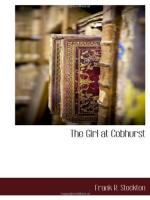“Kipper, indeed,” thought the old lady; “that is the last peg. A caterer’s tid-bit for a hard-working man. If she would have her fish cooked properly in her own house, she could give him six times as much for half the money. And positively,” she continued, in inward speech, as the maid presented the bread and butter, “Kipper’s biscuit! I suppose she is going to let him provide her with everything, just as he does for those rich people on Maple Avenue.”
The fish was very good, and Miss Panney ate every morsel of it, but made no remark concerning it. Instead of speaking of food, she talked of the doings of the Methodist congregation in Thorbury, who were planning to build a new church, far more expensive than she believed they could afford. She was engaged in berating Mr. Hampton, the minister, who, she declared, was actually encouraging his flock in their proposed extravagance, when the maid gave her a clean plate, and handed her a dish of sweetbread, tastefully garnished with clover blossoms and leaves. Miss Panney stopped talking, gazed at the dish for a minute, and then helped herself to a goodly portion of its contents.
“Feathers,” she said to herself; “no more than froth and feathers to a man who has been working hard half a day, and as to the extravagance of such flimsy victuals—” She could keep quiet no longer, she was obliged to speak out, and she burst into a tirade against people who called themselves pious, and yet, wilfully shutting their eyes, were about to plunge into wicked wastefulness. She ate as she talked, however, and she had brought up John Wesley, and was about to give her notion of what he would have had to say about a fancy church for a Thorbury congregation, when the plates were again changed, and a dainty dish of sirloin steak, with mushrooms, and thin slices of delicately browned potatoes, was put before her.
“Well!” inwardly ejaculated the old lady, “something substantial at last. But what money this meal must have cost!”
As she cut into the thick, juicy piece of steak, which had been broiled until it was cooked enough, and not a minute more, Miss Panney’s mind dropped from the consideration of congregational finances into that of domestic calculation. She knew Kipper’s charges; she knew everybody’s charges.
“That dish of fish,” she said to herself, “was not less than sixty cents; the sweetbreads cost a dollar, if they cost a cent; this sirloin, with mushrooms, was seventy-five cents; that, with the French biscuit, is two dollars and a half for a family lunch for two people.”
Miss Panney did not let her steak get cold, for she could talk and eat at the same time, and the founder of Methodism never delivered so scorching a tirade against pomp and show in professors of religion as she gave forth in his name.
Mrs. Tolbridge had been very quiet during the course of the meal, but she was now constrained to declare that she had nothing to do with the plans for the new Methodist church, and, in fact, she knew very little about them.




